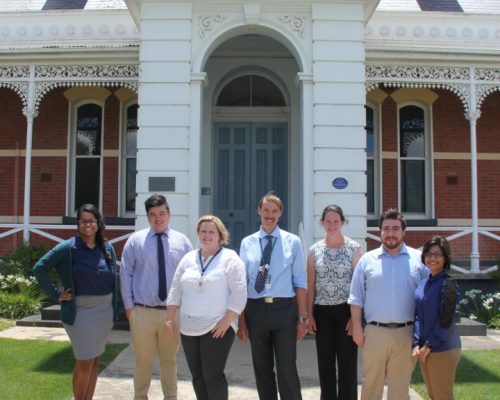Medical Interns have arrived in Ararat
The Grampians Medical Training intern program has welcomed its first ever intake of medical interns to Ararat this week. East Grampians Health Service Chief Executive Nick Bush welcomes the interns to the Health Service and said “This innovative program was developed to attract and retain a medical workforce with the right skill set for rural practice. It has been shown that doctors who train in rural areas are more likely to stay and practice.”
Mr Bush commented that The Grampians Medical Training program is a partnership between East Grampians Health Service, St John of God Ballarat Hospital and Maryborough District Health Service. It is a community based intern program where the interns gain experience in the roles as a rural doctor.
Junior Medical Officer Manager Sarah Woodburn said “Interns are doctors who have completed their medical degrees and are awarded provisional registration. The intern year enables these doctors to complete their first year of practice under supervision. Our five interns have completed their medical degrees at the University of Melbourne and Monash University.”
East Grampians Health Service Director of Medical Services Dr Eric Kennelly said “Grampians Medical Training is a unique program because it provides the interns exposure to both public and private health services and regional and rural locations.”
Dr Kennelly highlighted that each intern completes five rotations. Surgical terms will occur at East Grampians Health Service, Ararat and Maryborough District Health Service and will include almost daily sessions in theatre and significant exposure to anaesthetics. Medical and emergency terms will be at St John of God Ballarat Hospital. General Practice terms will occur at Clarendon Medical Centre and the Nightingale Clinic in Maryborough.
Intern Dr Caitlin Young commented that she applied for the rural intern placement after her experiences as a medical student in Maryborough and Bendigo inspired her to pursue a career in rural medicine. Dr Young reports that the key factors in this decision were the diverse and challenging role of doctors in rural areas, the sense of community, and the quality of supervision by dedicated mentors.”
 (03) 5352 9300IN AN EMERGENCY CALL 000
(03) 5352 9300IN AN EMERGENCY CALL 000




